Part 1 - Results
and table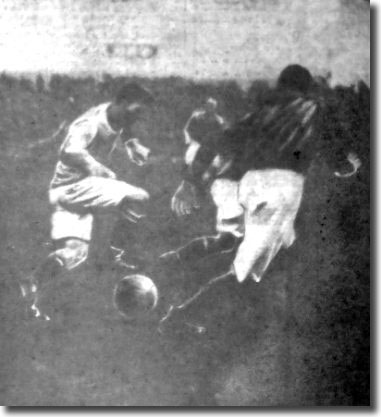
The start of a new decade is usually an exciting time, full of promise
and hope for the future. But for Leeds City, January 1910 brought nothing
but the grim prospect of a battle to preserve their Second Division status.
A run of just one win in 11 games had left the team languishing in the
bottom three - the Christmas period brought some respite with two wins
and a draw, but things took a nose dive again on New Year's Day when a
torrential downpour made for appalling conditions at Blackpool's South
Shore Ground. The Seasiders won 3-1, even though victory was only confirmed
when Millar headed home from a corner in the final minute. Leeds City
played well and may have secured a point had Blackpool keeper Fiske not
played the game of his life. The Leeds forwards had the better of the
home defenders from the off and got in many a shot on goal, but could
not find a way past the keeper.
A week later, City fought back from a goal down at home to Hull City
to share the points. They equalised through Jimmy Gemmell's smart shot
after Halligan had missed a centre from Fred Croot. In the first half
Billy McLeod put the ball in the net with his hand and saw the goal quite
rightly chalked off, but was then unlucky when a powerful drive hit the
upright.
The hard won point put City in good mood for a major test the following
week, in the FA Cup at mighty First Division Sunderland.
Undeterred by such feted opponents, Leeds outdid themselves and came
close to pulling off a shock. Wanderer wrote in the Mercury, 'I
have rarely seen the City team infuse more dash and vigour into their
play.'
It took the Black Cats almost an hour to take the lead through a brilliant
drive by England forward George Holley, and even then it seemed that City
would get back on terms. With twenty minutes to go, Fred Croot was brought
down by a defender in full flight towards goal to earn the visitors a
penalty kick.
Wanderer: 'McLeod was entrusted with the kick, but he soon damped the
ardour of his admirers by sending the ball over the crossbar. I fully
recognise that McLeod must have felt what a great responsibility rested
on his shoulders. The fate of his side, I might almost say, lay in the
palm of his hand; but still he ought to have made a better attempt than
he actually did. It must have been sheer nervousness that was responsible
for the weakness of the shot, and one could not help feeling sorry for
McLeod as he dejectedly walked down the field. He played a hard, dashing
game throughout, and it was a great pity that this one mistake should
have had such far-reaching effects. Such is the fortune of football.
'But what about the game? How many people expected that Leeds City would
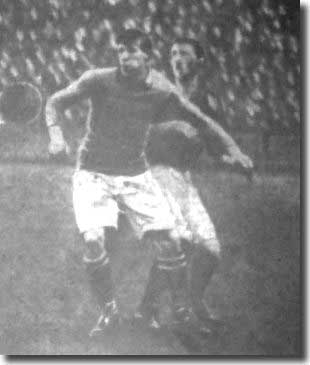 give
Sunderland such a hard tussle? Not many, I venture to say; in fact, in
Sunderland the match was regarded as a soft thing for the Roker Park men.
In the official programme it was stated "Everything points to a walkover
for Captain Thompson and his men," but the gentleman who wrote that
soon changed his tune, I should imagine, if he was present at the match.
Leeds City held their own throughout the game, and if the inside-forwards
had only indulged in a little more shooting they might easily have found
the net on more than one occasion.'
give
Sunderland such a hard tussle? Not many, I venture to say; in fact, in
Sunderland the match was regarded as a soft thing for the Roker Park men.
In the official programme it was stated "Everything points to a walkover
for Captain Thompson and his men," but the gentleman who wrote that
soon changed his tune, I should imagine, if he was present at the match.
Leeds City held their own throughout the game, and if the inside-forwards
had only indulged in a little more shooting they might easily have found
the net on more than one occasion.'
One might have expected that such a strong showing would revive City's
form in the League, but they contrived to lose twice in a row by a single
goal, away to Derby and Glossop, results that left them in dire straits.
12 February saw Leeds win a vital re-election clash against struggling
Birmingham with goals from Hugh Roberts and Fred Croot to revive flagging
spirits, but they quickly suffered another setback. The club was facing
severe financial difficulties and the directors accepted a bid of £400
from table topping Derby County for the talented Irishman, Billy Halligan.
The forward had proven an instant success for the Elland Road club, snatching
12 goals in 24 games, but money has always talked in football and City
just could not afford to turn down the cash. Athlone-born Halligan went
on to enjoy a glittering career, winning his first Irish cap while he
was at Derby and going on to feature with Wolves, Hull City, Preston,
Oldham and Nelson.
Over the previous few weeks, Adam Bowman and Jock Watson had also departed
the club, sold off to Portsmouth and Clyde as the club sought to replenish
its depleted coffers.
Halligan was a difficult man to replace - his countryman Tom Mulholland
did his best and got a goal on his return to the team, a week later at
home to Oldham. McLeod and Croot were also on the scoresheet, but the
Lancastrians scored five times to finish comfortable winners.
Stockport County added to City's woes the following week by inflicting
a 2-0 defeat on them, and two days later Leeds returned from West Bromwich
on the wrong end of a 3-1 defeat. The Peacocks were rooted in the bottom
two with the most goals conceded, 63. They had ten games to save themselves
and the knowledge that only four of those would be at home brought some
apprehension. City had won just once on their travels all season. For
manager Frank Scott-Walford
the moment of truth had arrived.
After a poor second half at West Bromwich, the Yorkshire Post
had seethed, 'Five or six men who wore the club's colours need to be replaced
if something like a sustained effort to bring Leeds City to the fore is
to be made … Affleck and White fell back to cover their goal with a fair
amount of judgement but their efforts to turn defence into attack were
not at all skilful.'
Wingman Fred Croot, back to his best, netted both goals, one a penalty,
in a draw at home to promotion chasing Fulham - City could count themselves
unlucky, for they had the better of the play. Billy McLeod's goal earned
a point at Barnsley, though the South Yorkshiremen had their minds elsewhere,
looking forward to their FA Cup semi final clash with Everton. 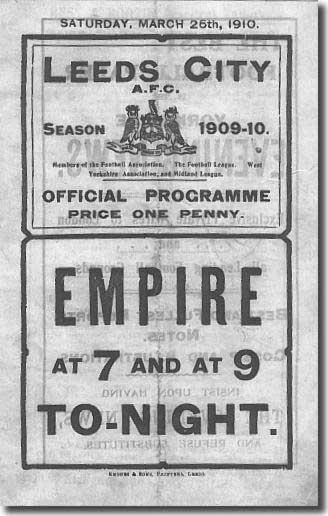 Nevertheless,
this same Barnsley team had put seven past Harry Bromage in October, so
this represented definite improvement.
Nevertheless,
this same Barnsley team had put seven past Harry Bromage in October, so
this represented definite improvement.
Following the club's successful staging of the amateur international
clash between England and Ireland in November, Leeds City were awarded
the prestigious honour of hosting Barnsley's semi final match and the
directors saw this as a massive vote of confidence in the potential of
both club and ground. Unfortunately, with the eyes of the football world
on Elland Road on Saturday March 26, things went sadly awry.
Martin Jarred and Malcolm Macdonald: 'Elland Road was swamped as fans
arrived from all directions. Neither the City administration nor the ground
were geared up to cope with the 36,000-plus crowd. Those that got in could
hardly see and thousands more were locked outside. Some of the turnstiles
were closed even before some of the excursion trains and coaches from
across the Pennines had arrived in Leeds.
'Thousands of disgruntled locked out fans packed Beeston Hill and tottered
gingerly on neighbouring rooftops, straining to get a glimpse of the action
below.
back to top
'The match finished goalless, with Everton goalkeeper Billy Scott, later
to join Leeds, having a fine game. But the lack of organisation was a
bigger disappointment than the match.
'The influential Athletic News reported: "It is clear that
the Association and the clubs concerned lost considerably by allotting
the match to a small ground constructed for Second Division football and
not for events of national importance."
'It had been a shambles and it was another 20 years before a new look
Elland Road was considered good enough to stage another FA Cup semi final.
That embarrassment was almost matched by City's performances on the pitch.'
That same afternoon, the Peacocks went down tamely, 4-2 at Bradford Park
Avenue, following a 3-0 reverse a week earlier at Burnley. The two defeats
in quick succession, extending the run of games without a win to seven,
left Leeds second bottom, with the division's worst defensive record.
They had won only one game since December 27, a run that had seen them
take a mere six points from 13 games.
Wanderer wrote of the Burnley debacle, 'they flattered only to deceive.
There was not that unity among the players, which is one of the essential
ingredients of success. The forwards did not seem to have any fixed plan
of attack, and gave one the impression that they were passing the ball
to where they thought the men ought to be, instead of to where they actually
were. They did not adapt themselves to circumstances either. Burnley are
a heavy, bustling lot, who are fond of swinging the ball about, and the
Citizens should have played them at their own game; but instead of that
they tried short passing movements - and failed. The team was disappointing
all round. There was little or no understanding between the forwards and
half-backs, and even when the latter did attempt to feed their front line
they kicked far too hard, with the inevitable result that the ball was
quickly returned by the opposing backs."
| |
Bottom of Division Two - 26 March 1910 |
| |
Pos
|
|
P
|
W
|
D
|
L
|
F
|
A
|
Pts
|
| |
13th
|
Burnley |
31
|
12
|
4
|
15
|
48
|
47
|
28
|
| |
14th
|
Stockport
County |
31
|
10
|
7
|
14
|
35
|
34
|
27
|
| |
15th
|
Lincoln
City |
32
|
9
|
9
|
14
|
36
|
58
|
27
|
| |
16th
|
Clapton
Orient |
30
|
9
|
5
|
16
|
26
|
47
|
23
|
| |
17th
|
Gainsborough
T |
31
|
9
|
4
|
18
|
28
|
66
|
22
|
| |
18th
|
Birmingham |
32
|
7
|
7
|
18
|
37
|
64
|
21
|
| |
19th
|
Leeds
City |
32
|
7
|
6
|
19
|
39
|
73
|
20
|
| |
20th
|
Grimsby
Town |
31
|
6
|
4
|
21
|
33
|
67
|
16
|
| |
|
|
|
|
|
|
|
|
|
With six games remaining, the likelihood of having to seek re-election
to the Football League was growing more acute with every week that passed.
A visit to the capital on Easter Monday, 28 March, brought a dour tussle
against Clapton Orient, also in trouble at the foot of the table.
From somewhere, Frank Scott-Walford's men managed to rediscover some
of their real form and they secured an impressive 2-0 victory to climb
two places up the rankings.
The Leeds Mercury reporter savoured the moment: 'The game at Homerton
was fast and vigorous, but much that was ragged and unscientific was in
evidence, the Orient, it may at once be said, being the principal offenders.
Leeds were the better side in every department, and more particularly
so after change of ends. The City forwards were many yards faster than
the opposition five, and combined in taking fashion all through the piece,
while a number of individual runs were distinctly clever.'
Billy McLeod scored both goals, opening his account in the 28th minute
by rounding off a neat 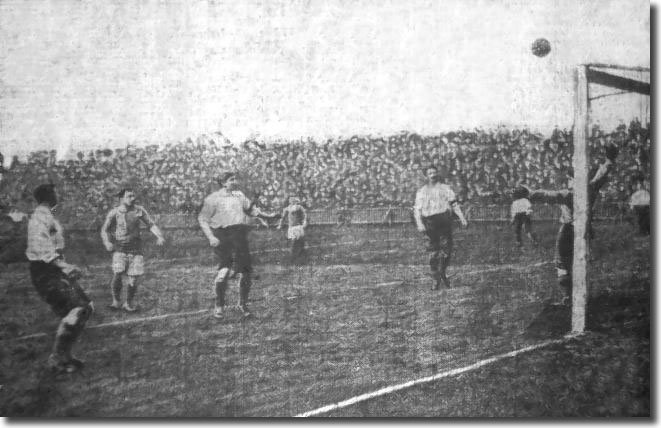 combination
among the forwards with a stinging drive. He had to wait until five minutes
from the end to add a second, slipping the ball home after drawing the
keeper out to meet him.
combination
among the forwards with a stinging drive. He had to wait until five minutes
from the end to add a second, slipping the ball home after drawing the
keeper out to meet him.
McLeod impressed throughout with his clever play and gave Orient pivot
Bell 'a heavy afternoon's work'.
back to top
It was again McLeod who settled the home game with Wolves five days later
with a fine goal in the first half, beating both full-backs before placing
his smart shot wide of Wanderers keeper Tommy Lunn. According to Sportsman
in the Mercury, the centre-forward's team mates also rose manfully
to the occasion: 'White (especially) and Affleck proved a pair of generally
sound and reliable backs, though it should be remembered that they were
rarely subjected to serious pressure. Cubberley was the most prominent
man in the intermediate line prior to the interval, but, taking the game
throughout, Morris, who gave a sound, praiseworthy display at centre-half,
must be awarded the palm. Horsley, who worked hard, completed a trio who
gave the opposing front rank little rope. The two wings, Roberts and Croot,
were the most effective forwards. McLeod did a few clever things but there
were occasions when he was deficient in dash and energy. Dougal was very
useful, and often combined well with Croot.'
David Dougal, recalled at inside-left for the Orient game, and showing
a new lease of life, had brought the best out of his forward colleagues,
and City looked a much better side for his inclusion.
If they had finally found some form on the field, there was trouble behind
the scenes. The services of Flaneur, a popular local football reporter,
had been enlisted by a number of City shareholders to take up their argument
with the board of directors. He wrote in the Leeds Mercury that
the shareholders had asked him 'to draw attention to certain correspondence
that has passed between them and the directors of the company with reference
to the calling of a meeting to consider the position of the club. It will
be remembered that some months ago such a meeting was held at the Salem
Hall, and that a suggestion was then made from the chair that such gatherings,
bringing directors and shareholders together for the common good of the
club, might be more frequently held. I have not the report of the Salem
Hall meeting by me, but, as one who attended, I gathered from Mr Henry's
remarks that at least one further meeting of the kind would be held during
the season.'
The shareholders had written to the club on 3 March asking for an extraordinary
meeting of the shareholders 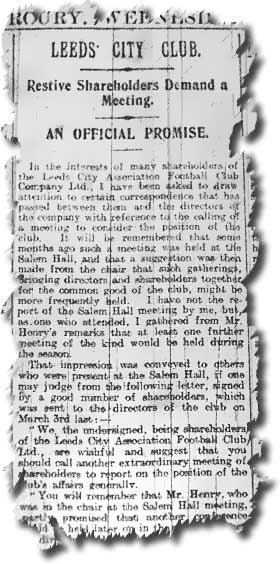 to
be called to report on the club's position. Frank Scott-Walford had written
back on behalf of the club, promising that the directors would consider
the matter.
to
be called to report on the club's position. Frank Scott-Walford had written
back on behalf of the club, promising that the directors would consider
the matter.
That response cut little ice with its recipients, who threatened to force
a meeting under the club's articles of association, unless the matter
was resolved within the week. Scott-Walford replied that it was 'the intention
of the directors to call a meeting of the shareholders at the most opportune
moment and that it will be at an early date'.
The frustrated shareholders were left to await 'the most opportune moment'.
That prompted Flaneur's correspondence in the Mercury of 6 April,
when he took pains to detail the course of events.
Flaneur had hinted the previous November at the difficulties when writing
of City's £9,000 overdraft and intention to raise new funds through a
share issue.
The wrangling and financial strictures were to drag on for years, but
further spats were kept out of the public eye until the start of the following
season when new funding was finally secured. For now, an uneasy truce
was called between the warring parties as City fought to retain their
Second Division status.
A 2-0 defeat at Gainsborough on 9 April brought Trinity level on points
with the Citizens. Wanderer wrote in frustration, 'Leeds City are a most
tantalising team. One week they play good football, and give promise of
lifting the club out of the League mire, and the next they are a very
mediocre lot indeed.'" Nevertheless both teams had three points to spare
on Birmingham and five on bottom placed Grimsby.
back to top
Two goals from Fred Croot and a third from Billy McLeod secured the points
a week later at Elland Road against Grimsby, confirming City's safety
and virtually condemning the Mariners to seek re-election.
Leeds were fully worthy of the points, exerting a stranglehold from the
off and went in at half time 2-0 to the good. They took the lead when
Croot's centre found McLeod in the middle with only Grimsby keeper Longsdale
to beat. The custodian parried the shot but could not hold it and right-half
Kelly was forced to handle the ball as it rolled towards the line. Croot
converted the penalty calmly.
Croot was also at the heart of City's second goal. His long shot looked
to be heading straight for the keeper until Grimsby left-back Henderson,
in a vain attempt to clear, screwed the ball into his own goal from some
distance out.
Sportsman in the Mercury: 'Grimsby had more of the game after
the interval, and Leonard reduced the lead with a fine shot, which first
struck the crossbar. Soon afterwards Horsley saved a dangerous situation
by kicking clear from near the posts in a scramble, while once Coulbeck
burst clean through, and, though sandwiched by the backs, contrived to
get in a shot at short range from which Bromage effected a really clever
save. Just before time McLeod registered City's third goal from a centre
by Croot, this effectively settling the issue.'
Sportsman had to acknowledge that City had been no great shakes, noting,
'Forward, Croot,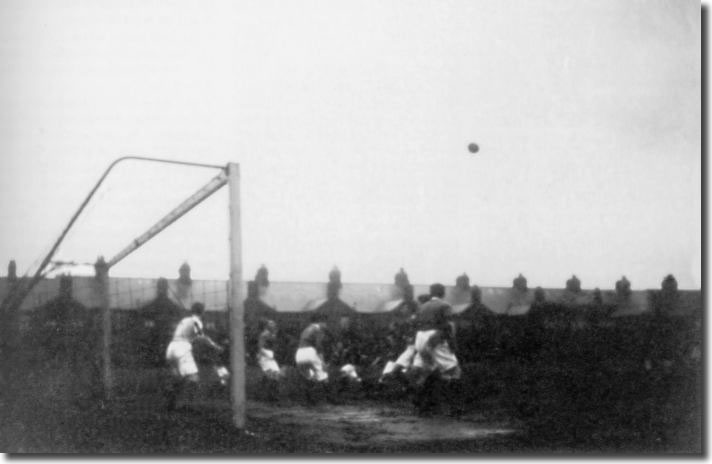 Roberts and McLeod were much the best. Mulholland was moderate, and Dougal
unsatisfactory. The inside men, generally were at times lacking in accuracy,
decision and method in front of goal.'
Roberts and McLeod were much the best. Mulholland was moderate, and Dougal
unsatisfactory. The inside men, generally were at times lacking in accuracy,
decision and method in front of goal.'
For a while, escape had seemed unlikely, but a run of six points from
eight had rescued the Peacocks just when all seemed bleakest. They had
reserved their best sequence of results for the moment when things were
most desperate, though they were to end the season with the worst defensive
record in the division, shipping 80 goals in all.
Survival confirmed, City contrived to lose 3-0 the following week at
table topping Manchester City, who went on to secure the Second Division
title. Leeds ended the campaign tamely, with a 1-1 draw at home to Leicester
Fosse confirming a 17th place finish. Sportsman spoke for all when he
wrote in the Mercury, 'Probably few of those who have the interests
of the Leeds City club at heart will regret that the curtain has been
rung down on a season which, both from a playing and financial point of
view, has been attended with such disastrous results.'
Billy McLeod finished top scorer for a fourth successive season with
15 goals from 28 games in an injury-ravaged campaign - Billy Halligan
had promised much before his move to Derby, netting 12 in 24. On the whole,
though, it had been a season to forget. Only three men, Harry Bromage,
Stan Cubberley and Fred Croot registered more than 30 appearances and
Frank Scott-Walford used 28 players in all, ringing the changes continually
as he searched in vain for a winning combination. Young George Affleck
had made his mark after earning a regular place at full-back and Bromage
had enjoyed a wonderful season back in goal, the most consistent performer
as he was left exposed time and again by the leakiest of defences. The
team never strung any form together, and only ever managed to win consecutive
games on two occasions. Attendances slumped with City's form, dropping
to an average 7,026, the lowest since they had joined the League.
Leeds City's aspirations had been high when the club was formed in 1904,
but now their hopes had become as ash. This was not what the board had
brought Scott-Walford in for and disillusionment had well and truly set
in at a demoralised football club.
Part 1 - Results
and table












 give
Sunderland such a hard tussle? Not many, I venture to say; in fact, in
Sunderland the match was regarded as a soft thing for the Roker Park men.
In the official programme it was stated "Everything points to a walkover
for Captain Thompson and his men," but the gentleman who wrote that
soon changed his tune, I should imagine, if he was present at the match.
Leeds City held their own throughout the game, and if the inside-forwards
had only indulged in a little more shooting they might easily have found
the net on more than one occasion.'
give
Sunderland such a hard tussle? Not many, I venture to say; in fact, in
Sunderland the match was regarded as a soft thing for the Roker Park men.
In the official programme it was stated "Everything points to a walkover
for Captain Thompson and his men," but the gentleman who wrote that
soon changed his tune, I should imagine, if he was present at the match.
Leeds City held their own throughout the game, and if the inside-forwards
had only indulged in a little more shooting they might easily have found
the net on more than one occasion.' Nevertheless,
this same Barnsley team had put seven past Harry Bromage in October, so
this represented definite improvement.
Nevertheless,
this same Barnsley team had put seven past Harry Bromage in October, so
this represented definite improvement. combination
among the forwards with a stinging drive. He had to wait until five minutes
from the end to add a second, slipping the ball home after drawing the
keeper out to meet him.
combination
among the forwards with a stinging drive. He had to wait until five minutes
from the end to add a second, slipping the ball home after drawing the
keeper out to meet him. to
be called to report on the club's position. Frank Scott-Walford had written
back on behalf of the club, promising that the directors would consider
the matter.
to
be called to report on the club's position. Frank Scott-Walford had written
back on behalf of the club, promising that the directors would consider
the matter. Roberts and McLeod were much the best. Mulholland was moderate, and Dougal
unsatisfactory. The inside men, generally were at times lacking in accuracy,
decision and method in front of goal.'
Roberts and McLeod were much the best. Mulholland was moderate, and Dougal
unsatisfactory. The inside men, generally were at times lacking in accuracy,
decision and method in front of goal.'